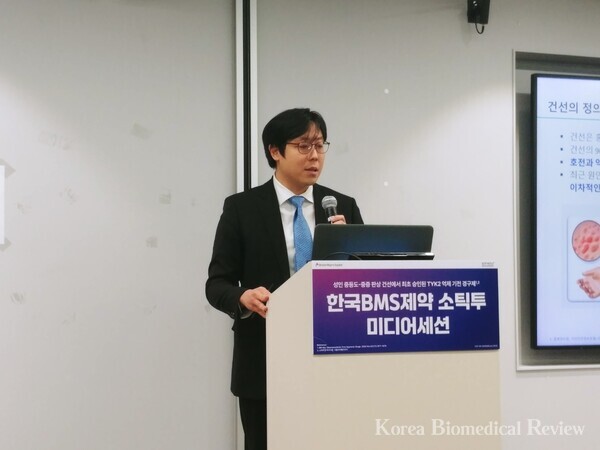Bristol Myers Squibb (BMS) Korea presented a patient-specific treatment, utilizing its psoriasis drug, Sotyktu (deucravacitinib), in a media session in Seoul on Thursday.

Psoriasis is a chronic, non-infectious skin disease with repeated flare-ups and remissions.
According to Bang Chul-hwan, professor of dermatology at Seoul St. Mary's Hospital, psoriasis requires consistent treatment and management as it can lead to complications such as metabolic syndrome, including hyperlipidemia if it persists for more than 10 years.
"For psoriasis, it is important to identify patient characteristics by conducting tuberculosis testing, viral hepatitis testing, and proper immunizations before starting treatment," Bang said.
Sotyktu is a first-in-class, selective Tyrosine Kinase 2 (TYK2) inhibitor approved by the Ministry of Food and Drug Safety (MFDS) in August last year to treat moderate to severe plaque psoriasis in adult patients.
TYK2 is a central link in the IL-23/IL-17 pathway, which is known to play a key role in the pathogenesis of psoriasis, and Sotyktu selectively targets and inhibits TYK2 signaling.
Professor Bang also emphasized that psoriasis is most prevalent in patients in their 40s and 50s who are socially active, and systemic treatments include biologics and oral therapies for moderate and severe cases.
“Previous psoriasis drugs require two or three separate doses and have various side effects, but Sotyktu can be taken orally once daily, regardless of food intake, which is expected to provide convenience for patients with poor tolerance to injectables,” he went on to say.
The phase 3 clinical trials (POETYK-PSO 1 and 2) confirmed the efficacy and safety of Sotyktu in adult patients with moderate to severe plaque psoriasis requiring phototherapy.
In the phase 3 study, the psoriasis area and severity index (PASI) 75 response at week 16 of treatment in the Sotyktu arm were 58.4 percent and 53.0 percent, respectively, compared to 35.1 percent and 39.8 percent in Amgen's Otezla (apremilast) arm and 12.7 percent and 9.4 percent in the placebo arm.
BMS Korea said that Sotyktu's safety and efficacy have been confirmed in clinical trials and are comparable to biologics.
"Sotyktu is a new treatment option for patients suffering from psoriasis, and we look forward to being a part of their treatment journey," said a BMS Korea official.
However, Sotyktu has yet to receive reimbursement in Korea.
Earlier in December, the Health Insurance Review and Assessment Service (HIRA) concluded that Sotyktu 6mg could receive insurance benefits if BMS Korea accepts the evaluated amount or less.
The BMS Korea official did not comment on the reimbursement issue.
Related articles
- BMS’ Camzyos to change treatment paradigm of obstructive HCM treatment
- BMS Korea's psoriasis drug gets partial success in reimbursement challenge
- BMS’ Sotyktu scores nod for plaque psoriasis patients
- BMS Onureg bags insurance coverage in Korea for AML patients
- Psoriasis patients should manage obesity to improve drug response
- BMS’ oral plaque psoriasis drug Sotyktu gets reimbursement starting April
- BMS exec celebrates winning nod for 6 drugs in Korea in 2 years
- Regulator approves four generics of oral psoriasis treatment Otezla

